|
|
|
Sort Order |
|
|
|
Items / Page
|
|
|
|
|
|
|
| Srl | Item |
| 1 |
ID:
108863
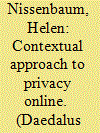

|
|
|
|
|
| Publication |
2011.
|
| Summary/Abstract |
Recent media revelations have demonstrated the extent of third-party tracking and monitoring online, much of it spurred by data aggregation, profiling, and selective targeting. How to protect privacy online is a frequent question in public discourse and has reignited the interest of government actors. In the United States, notice-and-consent remains the fallback approach in online privacy policies, despite its weaknesses. This essay presents an alternative approach, rooted in the theory of contextual integrity. Proposals to improve and fortify notice-and-consent, such as clearer privacy policies and fairer information practices, will not overcome a fundamental flaw in the model, namely, its assumption that individuals can understand all facts relevant to true choice at the moment of pair-wise contracting between individuals and data gatherers. Instead, we must articulate a backdrop of context-specific substantive norms that constrain what information websites can collect, with whom they can share it, and under what conditions it can be shared. In developing this approach, the paper warns that the current bias in conceiving of the Net as a predominantly commercial enterprise seriously limits the privacy agenda.
|
|
|
|
|
|
|
|
|
|
|
|
|
|
|
|
| 2 |
ID:
108866
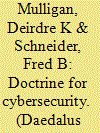

|
|
|
| 3 |
ID:
108864


|
|
|
|
|
| Publication |
2011.
|
| Summary/Abstract |
Every day, individuals around the world retrieve, share, and exchange information on the Internet. We interact online to share personal information, find answers to questions, make financial transactions, play social games, and maintain professional and personal relationships. Sometimes our online interactions take place between two or more humans. In other cases, we rely on computers to manage information on our behalf. In each scenario, risk and uncertainty are essential for determining possible actions and outcomes. This essay highlights common deficiencies in our understanding of key concepts such as trust, trustworthiness, cooperation, and assurance in online environments. Empirical evidence from experimental work in computer-mediated environments underscores the promises and perils of overreliance on security and assurance structures as replacements for interpersonal trust. These conceptual distinctions are critical because the future shape of the Internet will depend on whether we build assurance structures to limit and control ambiguity or allow trust to emerge in the presence of risk and uncertainty.
|
|
|
|
|
|
|
|
|
|
|
|
|
|
|
|
| 4 |
ID:
108870
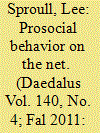

|
|
|
|
|
| Publication |
2011.
|
| Summary/Abstract |
Volunteers and charitable organizations contribute significantly to community welfare through their prosocial behavior: that is, discretionary behavior such as assisting, comforting, sharing, and cooperating intended to help worthy beneficiaries. This essay focuses on prosocial behavior on the Internet. It describes how offline charitable organizations are using the Net to become more efficient and effective. It also considers entirely new models of Net-based volunteer behavior directed at creating socially beneficial information goods and services. After exploring the scope and diversity of online prosocial behavior, the essay focuses on ways to encourage this kind of behavior through appropriate task and social structures, motivational signals, and trust indicators. It concludes by asking how local offline communities ultimately could be diminished or strengthened as prosocial behavior increases online.
|
|
|
|
|
|
|
|
|
|
|
|
|
|
|
|
| 5 |
ID:
108867
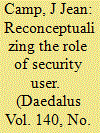

|
|
|
|
|
| Publication |
2011.
|
| Summary/Abstract |
The Internet is not the only critical infrastructure that relies on the participation of unorganized and technically inexpert end users. Transportation, health, waste management, and disaster preparedness are other areas where cooperation between unorganized citizens who lack experience with the domain has increased resiliency, reduced social costs, and helped meet shared goals. Theories of community-based production and management of the commons explain this type of cooperation, both offline and online. This essay examines these two complementary approaches to organizing the cybercitizen for cybersecurity. Cybersecurity discourse has reasonably focused on centralized parties and network operators. From domain name registrars to network service providers, solutions are sought through incentives, regulation, and even law enforcement. However great the ability of these centralized entities to implement change, the end user plays a crucial role. The Internet must remain open to enable innovation and diffusion of innovation; thus, the end user will continue to be important. What is the role of the citizen in cybersecurity? What socio-technical characteristics might enable a system that encourages and empowers users to create a secure infrastructure?
|
|
|
|
|
|
|
|
|
|
|
|
|
|
|
|
| 6 |
ID:
108868


|
|
|
|
|
| Publication |
2011.
|
| Summary/Abstract |
Must the Internet promote political fragmentation? Although this is a possible outcome of personalized online news, we argue that other futures are possible and that thoughtful design could promote more socially desirable behavior. Research has shown that individuals crave opinion reinforcement more than they avoid exposure to diverse viewpoints and that, in many situations, hearing the other side is desirable. We suggest that, equipped with this knowledge, software designers ought to create tools that encourage and facilitate consumption of diverse news streams, making users, and society, better off. We propose several techniques to help achieve this goal. One approach focuses on making useful or intriguing opinion-challenges more accessible. The other centers on nudging people toward diversity by creating environments that accentuate its benefits. Advancing research in this area is critical in the face of increasingly partisan news media, and we believe these strategies can help.
|
|
|
|
|
|
|
|
|
|
|
|
|
|
|
|
| 7 |
ID:
108865
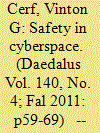

|
|
|
|
|
| Publication |
2011.
|
| Summary/Abstract |
Safety in cyberspace continues to be an elusive objective. This essay explores various metaphors to aid thinking about the means by which safety might be increased. Notions such as cyber-fire-departments or cyber-police-departments as well as models drawn from public health scenarios are considered. The legal frameworks in which safety can be improved and international agreements adopted toward this end are briefly discussed. Users can also contribute to their own safety by adopting various practices that reduce vulnerability to cyber-infection and compromise.
|
|
|
|
|
|
|
|
|
|
|
|
|
|
|
|
| 8 |
ID:
108862


|
|
|
|
|
| Publication |
2011.
|
| Summary/Abstract |
The evolution of the Internet in the past decade - from a slow, stationary, and primarily communications-based technology to a mobile, fast technology that supports a range of communication, participatory, and transactional applications - has made access more valuable, and disconnection more consequential, for individuals. This evolution means that stakeholders should embrace a different framing of the digital divide, focusing on the costs of digital exclusion. These costs can fall on an individual, if the Internet is the only way to carry out some tasks, and on society, if expensive and less-efficient legacy systems must be maintained to serve a shrinking minority without access. Whereas the digital divide debate concerns technology scarcity for certain population segments, addressing the costs of digital exclusion is about developing people's capacity to manage today's abundance of digital resources. This essay offers suggestions on a framework to develop tools that will enable individuals to take advantage of the affordances of broadband.
|
|
|
|
|
|
|
|
|
|
|
|
|
|
|
|
| 9 |
ID:
108869


|
|
|
|
|
| Publication |
2011.
|
| Summary/Abstract |
Using an August 2008 representative survey of Americans conducted by the Pew Internet & American Life Project, we investigate the consequences of Internet-based political activity for long-standing patterns of participatory inequality. There is little evidence of change in the extent to which political participation is stratified by socioeconomic status, even when we account for the fact that the well educated and affluent are more likely to be Internet users. However, because young adults are much more likely than their elders to be comfortable with electronic technologies and to use the Internet, the Web has ameliorated the well-known participatory deficit among those who have recently joined the electorate. Still, among Internet users, the young are not especially politically active. How these trends play out in the future depends on what happens to the current Web-savvy younger generation and the cohorts that follow as well as on the rapidly developing political capacities of the Web.
|
|
|
|
|
|
|
|
|
|
|
|
|
|
|
|
| 10 |
ID:
108871


|
|
|
|
|
| Publication |
2011.
|
| Summary/Abstract |
The WikiLeaks affair and proposed copyright bills introduced in the Senate are evidence of a new, extralegal path of attack aimed at preventing access and disrupting the payment systems and advertising of targeted sites. In this model, the attacker may be a government agency seeking to circumvent constitutional constraints on its power or a private company trying to enforce its interests beyond those afforded by procedural or substantive safeguards in the law. The vector of attack runs through the targeted site's critical service providers, disrupting technical services, such as Domain Name System service, cloud storage, or search capabilities; and business-related services, such as payment systems or advertising. The characteristics that make this type of attack new are that it targets an entire site, rather than aiming for removal or exclusion of specific offending materials; operates through denial of business and financial systems, in addition to targeting technical systems; and systematically harnesses extralegal pressure to achieve results beyond what law would provide or even permit.
|
|
|
|
|
|
|
|
|
|
|
|
|
|
|
|
|
|
|
|
|